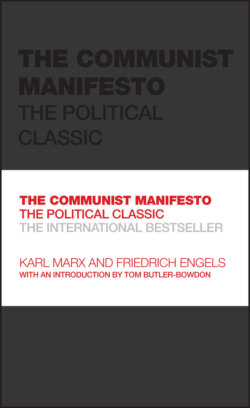The Communist Manifesto

Реклама. ООО «ЛитРес», ИНН: 7719571260.
Оглавление
Karl Marx. The Communist Manifesto
Table of Contents
Guide
Pages
THE COMMUNIST MANIFESTO. The Political Classic
AN INTRODUCTION
YOUNG PHILOSOPHER
CRUSADING JOURNALIST
PARIS AND BRUSSELS
THE WRITING OF THE MANIFESTO
PUBLICATION AND RECEPTION
A DARWIN FOR POLITICS
RISE OF THE MIDDLE CLASS
WORKING CLASSES SINK LOWER
BOURGEOIS CONSPIRACY
THE ONLY WAY IS REVOLUTION
AFTERMATH
CRITIQUE
CONCLUSION
Note on the Translation
KARL MARX
FRIEDRICH ENGELS
ABOUT TOM BUTLER-BOWDON
THE COMMUNIST MANIFESTO
PREFACE TO 1888 ENGLISH EDITION
NOTE
MANIFESTO OF THE COMMUNIST PARTY
I BOURGEOIS AND PROLETARIANS*
NOTES
II PROLETARIANS AND COMMUNISTS
III SOCIALIST AND COMMUNIST LITERATURE
1. Reactionary Socialism. A. Feudal Socialism
B. Petty-Bourgeois Socialism
C. German or “True” Socialism
2. Conservative or Bourgeois Socialism
3. Critical-Utopian Socialism and Communism
NOTES
IV POSITION OF THE COMMUNISTS IN RELATION TO THE VARIOUS EXISTING OPPOSITION PARTIES
NOTE
APPENDIX A LETTER FROM ENGELS TO MARX, 24 NOVEMBER 1847. Paris, 23-24 November 1847
Tuesday evening
APPENDIX B DRAFT OF A COMMUNIST CONFESSION OF FAITH*
NOTE
APPENDIX C THE PRINCIPLES OF* COMMUNISM. 1. What is Communism?
2. What is the proletariat?
3. Proletarians, then, have not always existed?
4. How did the proletariat originate?
5. Under what conditions does this sale of the labour of the proletarians to the bourgeoisie take place?
6. What working classes were there before the industrial revolution?
7. In what way do proletarians differ from slaves?
8. In what way do proletarians differ from serfs?
9. In what way do proletarians differ from handicraftsmen?
10. In what way do proletarians differ from manufacturing workers?
11. What were the immediate consequences of the industrial revolution and of the division of society into bourgeoisie and proletariat?
12. What were the further consequences of the industrial revolution?
13. What follows from these periodic commercial crises?
14. What will this new social order have to be like?
15. Was not the abolition of private property possible at an earlier time?
16. Will the peaceful abolition of private property be possible?
17. Will it be possible for private property to be abolished at one stroke?
18. What will be the course of this revolution?
19. Will it be possible for this revolution to take place in one country alone?
20. What will be the consequences of the ultimate disappearance of private property?
21. What will be the influence of communist society on the family?
22. What will be the attitude of communism to existing nationalities?
23. What will be its attitude to existing religions?
24. How do communists differ from socialists?
[Reactionary Socialists:]
[Bourgeois Socialists:]
[Democratic Socialists:]
25. What is the attitude of the communists to the other political parties of our time?
NOTE
WILEY END USER LICENSE AGREEMENT
Отрывок из книги
Also available in the same series:
FRIEDRICH ENGELS
.....
With an Introduction by
TOM BUTLER-BOWDON
.....